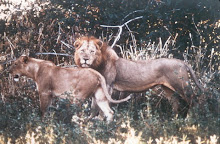Norman Carr pioneered walking safaris back in the 1950’s and the Luangwa Valley today is still one of the best places to explore on foot. Game drives are also on offer but as Norman always maintained, to view the bush from a vehicle is simply to be an observer, but to get out on foot was to become a part of your surroundings. To stand in silence and see the flick of a lion's tail as he disappears into the bush acutely aware of your presence as another apex predator is infinitely more exciting than sitting in a jeep somehow apart from the real wilderness.
The Luangwa Valley is the home of the walking safari and in recent years many private reserves and National Parks across Africa have tried to recreate the experience but nowhere yet comes close to the Luangwa. The level of training required before qualifying as a walking guide and the guide’s partnership with highly trained armed scout means we can enable guests to get close to big game on foot, like the safari hunters of old, but in safety and also without impacting negatively on the wildlife in any way.
All walking safaris in Zambia are led by an armed wildlife ranger – they’re called Scouts in Zambia; he is followed by the professional safari guide. In other countries walks are often led by one armed scout. The idea of having two fully trained experts at the head of each walk was conceived by Norman and has been tried and tested for decades with an unparalleled safety record and we firmly believe that it is the safest way to conduct a walking safari.
The bush is a potentially dangerous place and in an emergency situation – the Scout handles the wildlife potential hazard while the Guide concentrates on guests getting out of any danger zone.
It’s true - in a vehicle you cover more ground and are likely to see greater volumes of game, but as soon as you get out of the vehicle on foot in the bush you become a part of it, you can hear, smell and feel the bush as well as see it. It's infinitely exciting in a different way; many of our guests have called it a life changing experience. The smaller mysteries of the wilderness start to reveal themselves, how every aspect of the bush is inextricably linked.
Together with the skill of the guide and scout team guests are able to have a far deeper and more intimate experience. It’s no longer an exercise in ticking off sightings but the start of what for many people becomes a lifelong and ever growing passion.
Over many decades this way of walking has proved extremely safe both for guests – and as importantly, the wildlife.
Although young children are not allowed in the Park on foot (lower age limit of 12 years to walk), there is no upper age limit and one doesn't need a high level of fitness. Walks are conducted at a slow pace. We usually have a tea bearer walking with us and plan a break or two in the shade of a tree or watching the river flow past.
When Norman Carr first started exploring the Luangwa Valley with guests, he was usually accompanied by porters laden with the supplies and kit needed to make camp. Life is a little easier today and we like to provide our guests with a few more creature comforts than could easily be carried on foot.
We have not, however lost sight of the excitement of the raw and real experience of camping out in temporary bush camps. The pioneering sense of adventure and closeness to the wild when walking from camp to camp is still at the heart of what we do. Now we do it in real comfort and style but, most importantly – still with some of the best guides in Africa.
Our four bush camps have been carefully sited in areas close to waterholes or rivers, sites which have been chosen for their special beauty and wildlife importance. The camps are very different from each other and have been placed strategically so that guests can walk between in a circuit.
A safari including a combination of bush camps gives you the best of the varied and diverse habitats of the Luangwa Valley and an experience of ‘safari’ in the true sense of the word.
Luwi and Nsolo Bush Camps are both deep in the middle of the South Luangwa National Park, the only camps on the course of the Luwi River, a tributary of the Luangwa. Often the real safari starts in these camps – exploring the Luwi River valley and heading down river to the Luangwa – they find Kakuli placed on the confluence of the Luwi and Luangwa Rivers built on a high bank overlooking huge hippo pods and productive grazing lawns. Just up river is Mchenja, our most luxurious and sophisticated bush camp and a wonderful place to end your safari adventure.
The distance between each camp can be covered in 3 – 5 hours depending upon the wildlife along the way and levels of fitness of the guests. One can never tell what you will see. You may divert to sit and watch a herd of elephants or be attracted by the alarm calls of a troop of baboons as they sound out the presence of a predator.
Either way, when you arrive at your next camp your bags will be in your room and you will be welcomed with a warm smile and a cold drink. If you prefer to walk some of the way then rest your legs and game drive the rest - we can of course arrange that.
Original can be found here
Sunday, August 26, 2012
Subscribe to:
Post Comments (Atom)


No comments:
Post a Comment